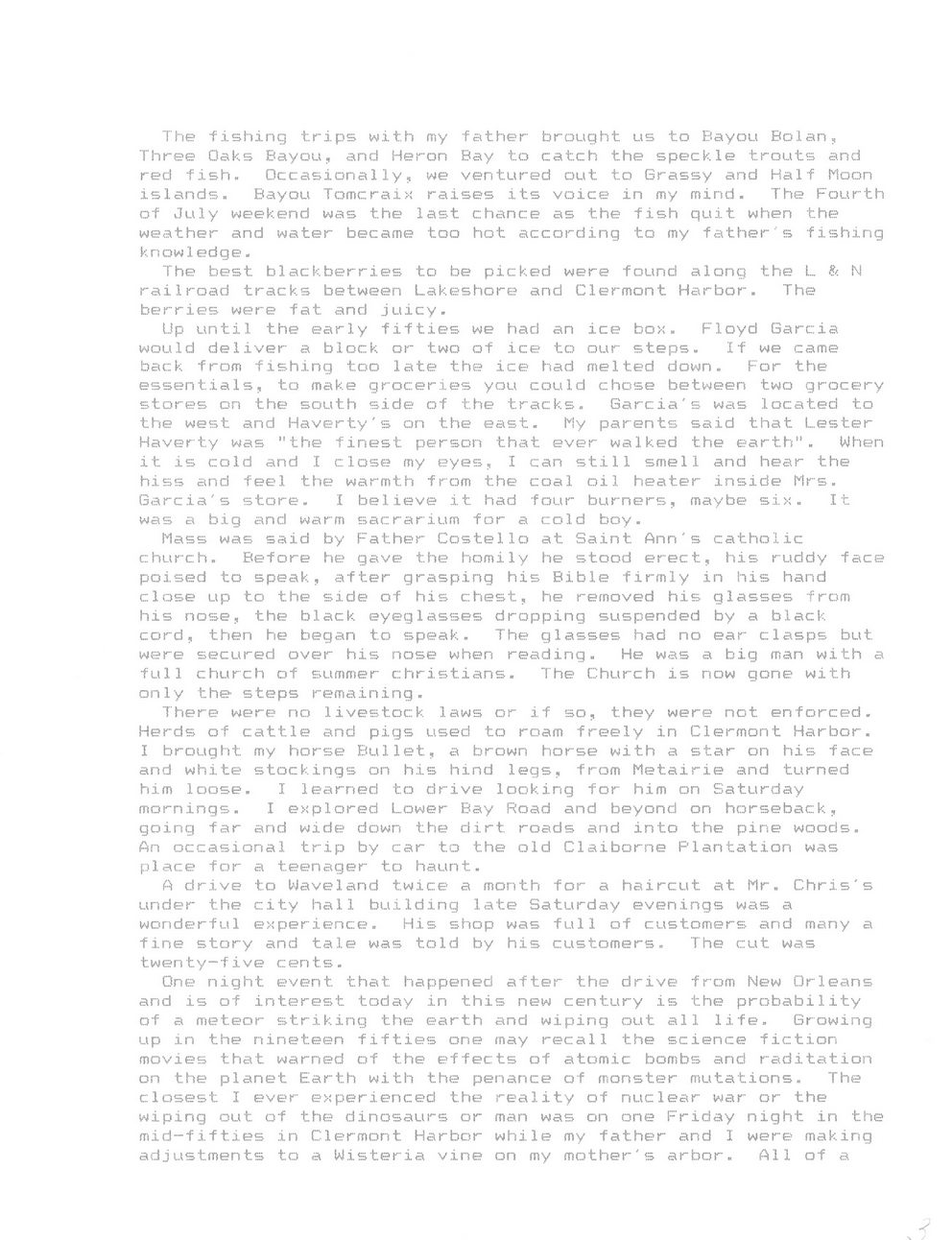This text was obtained via automated optical character recognition.
It has not been edited and may therefore contain several errors.
The fishing trips with my father brought us to Bayou Bolan, Three Oaks Bayou, and Heron Bay to catch the speckle trouts and red fish. Occasionally, we ventured out to Grassy and Half Moon islands. Bayou Tomcraix raises its voice in my mind. The Fourth of July weekend was the last chance as the fish quit when the weather and water became too hot according to my father's fishing knowledge. The best, blackberries to be picked were found along the L & N railroad tracks between Lakeshore and Clermont Harbor. The berries were fat and juicy. Up until the early fifties we had an ice? box. Floyd Garcia would deliver a block or two of .ice to our steps. If we came back from fishing too late the ice had melted down. For the essentials, to make groceries you could chose between two grocery stores on the south sides of the tracks. Garcia's was located to the west and Haverty's on the east. My parents said that Lester Haverty was "the finest person that ever walked the earth". When it is cold and I close my eyes, I can still smell and hear the hiss and feel the warmth from the coal oil heater inside Mrs. Garcia's store. I believe it had four burners, maybe six. It was a big and warm sacrarium for a cold boy. Mass was said by Father Costello at Saint Ann's catholic church. Before he? gave the homily he stood erect, his ruddy face poised to speak, after grasping his Bible firmly in his hand close up to the side of his chest, he removed his glasses from his nose, the black eyeglasses dropping suspended by a black cord, then he began to speak. The glasses had no ear clasps but. were secured over his nose when reading. He was a big man with a full church of summer Christians. The Church is now gone with only the- steps remaining. There were no livestock laws or if so, they were not enforced. Herds of cattle and pigs used to roam freely in Clermont Harbor. I brought, my horse Bullet, a brown horse with a star on his face and white stockings on his hind legs, from Metairie and turned him loose. I learned to drive looking for him on Saturday mornings. I explored Lower E-iay Road and beyond on horseback, going far and wide down the dirt, roads and into the pine woods. An occasional trip by car to the old Claiborne Plantation was place for a teenager to haunt. A drive to Waveland twice a month for a haircut at Mr. Chris's under the city hall building late Saturday evenings was a wonderful experience. His shop was full of customers and many a fine story and tale was told by his customers. The cut was twenty?five cents. One night event, that, happened after the drive from New Orleans and is of interest today in this new century is the probability of a meteor striking the earth and wiping out all life. Growing up in the nineteen fifties one may recall the science fiction movies that warned of the effects of atomic bombs and raditation on the planet Earth with the penance of monster mutations. The closest. I ever experienced the reality of nuclear war or the wiping out. of the dinosaurs or man was on one Friday night in the mid-fifties in Clermont Harbor while my father and I were making adjustments to a Wisteria vine on my mother's arbor. All of a

Kraus 003